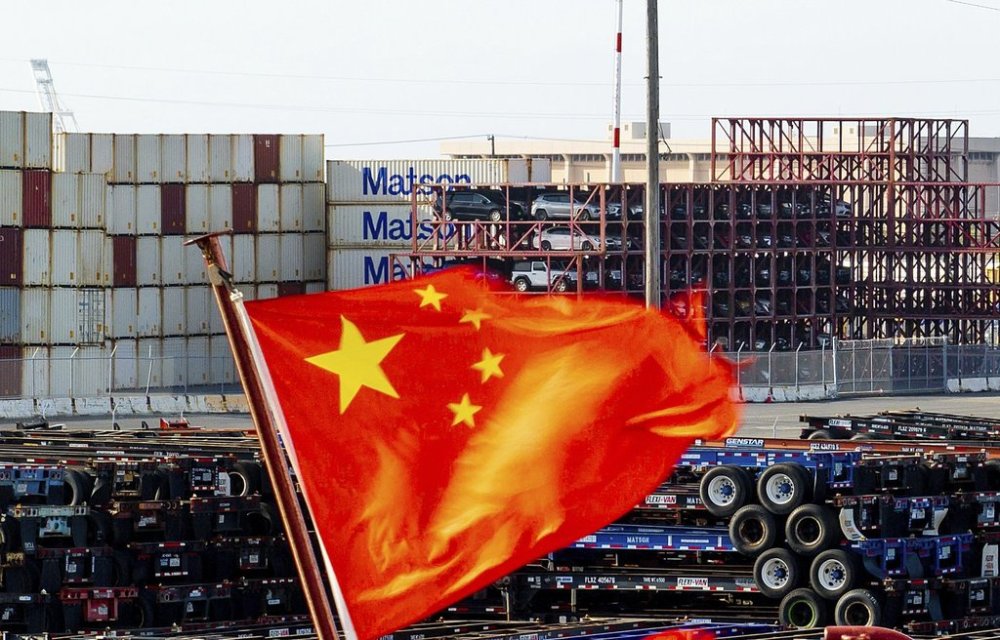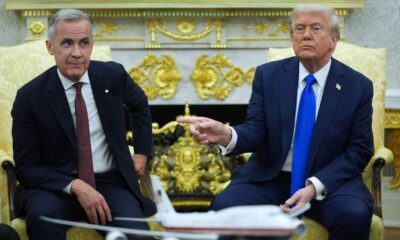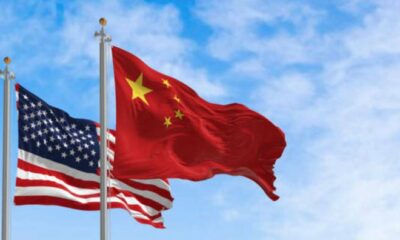World
U.S.-China Trade Talks Set to Address Export Dependence Next Week

Negotiations between the United States and China are set to take center stage in Stockholm next week, with a significant focus on China’s heavy reliance on exports. While a trade agreement may be on the table, experts caution that such an accord will not automatically facilitate the rebalancing of China’s economy.
Scott Bessent, the U.S. Treasury Secretary, has expressed optimism that discussions will delve into critical topics, including China’s oil purchases from Russia and Iran, which undermine U.S. sanctions. Increased hopes for a breakthrough in the talks have emerged following U.S. President Donald Trump‘s announcements of agreements with Japan, Indonesia, and the Philippines earlier this week.
The U.S. aims to address two main issues: first, to reduce what both the U.S. and the European Union identify as excess production capacity across numerous industries, particularly in steel and electric vehicles. Secondly, the focus will shift to encouraging greater consumer spending in China, reducing the country’s economic dependence on exports.
Bessent noted the need for a discussion on the pressing issue of economic rebalancing, stating, “China’s share of global manufacturing exports at nearly 30% can’t get any bigger, and it should probably shrink.” While these topics are not new, they have been on China’s agenda for years, primarily driven by domestic needs rather than solely by the desire to reduce trade surpluses with other nations.
Former Treasury Secretary Janet Yellen highlighted industrial policy during her visit to China last year, attributing the flooding of global markets with “artificially cheap Chinese products” to government subsidies. This issue has also been cited by the European Union, which recently imposed tariffs on Chinese electric vehicles as a response to these subsidies.
Historically, the U.S. had similar interactions with Japan in the 1980s, pressing for increased consumer spending when American manufacturing faced challenges from Japanese exports. Economists argue that China needs to transition towards a consumer-driven economy, as consumer spending currently makes up less than 40% of its GDP. In comparison, this figure stands at approximately 70% in the United States and 54% in Japan.
Chinese leaders have acknowledged long-term challenges posed by factory overcapacity and weak consumer spending. Over the past two decades, there have been efforts to shift the economy away from an over-reliance on export manufacturing and large-scale investments in infrastructure projects.
Intense competition has led to price wars, prompting critical reports in state media that warn of companies “racing to the bottom” at the expense of quality and safety. The resulting deflation has compounded the issue, as reduced income from sales leads to decreased investment, job cuts, and lower wages—all of which undermine the goal of boosting consumer spending.
In response, the government has implemented significant financial incentives, including billions allocated for rebates and subsidies aimed at encouraging consumers to trade in old vehicles and appliances. Nevertheless, mere acknowledgment of the problem does not equate to effective solutions. Economists emphasize that more substantial reforms are necessary to enhance consumption and manage overcapacity, and these changes may unfold gradually.
Private enterprises and foreign-invested companies, which are crucial for job creation, have faced challenges from fluctuating policies and the impacts of the ongoing trade war, particularly since the onset of the pandemic. Demographic shifts are also a concern, as China’s population is both shrinking and aging.
Experts including Yan Se, an economist from Peking University, have suggested that expanding China’s social safety net—such as health insurance and pensions—could alleviate consumer hesitance to spend. “Chinese people deserve a better life,” he stated.
Another proposal from Liu Qiao, the dean of the business school at Peking University, calls for altering incentives for local government officials, advocating for rewards tied to increasing consumption and household incomes rather than merely pursuing economic growth targets. While he acknowledges the challenges of implementing such changes nationwide, testing them in specific provinces could signal a shift in priorities.
As Xi Jinping emphasizes the goal of transforming China into a leading technology superpower, the urgency of this objective has intensified amidst tightening U.S. restrictions on China’s access to advanced technologies. The rapid growth in high-tech manufacturing is raising concerns over potential overcapacity, similar to the previous surge in green technologies like solar panels and wind turbines.
Moving forward, the Chinese government is advocating for better coordination of economic development policies within emerging sectors such as artificial intelligence, aiming to prevent multiple provinces from promoting the same industries. However, governmental measures to counter the effects of higher tariffs have often favored already overcapacity sectors, further diminishing the share of consumption in the economy.
The World Bank has indicated that substantial improvements in household consumption will necessitate a bolder reform agenda. As the U.S.-China negotiations approach, the world will be watching closely to see how these discussions may influence the future of both economies.
-

 World3 months ago
World3 months agoScientists Unearth Ancient Antarctic Ice to Unlock Climate Secrets
-

 Entertainment3 months ago
Entertainment3 months agoTrump and McCormick to Announce $70 Billion Energy Investments
-

 Science3 months ago
Science3 months agoFour Astronauts Return to Earth After International Space Station Mission
-

 Lifestyle3 months ago
Lifestyle3 months agoTransLink Launches Food Truck Program to Boost Revenue in Vancouver
-

 Technology2 months ago
Technology2 months agoApple Notes Enhances Functionality with Markdown Support in macOS 26
-

 Top Stories1 week ago
Top Stories1 week agoUrgent Update: Fatal Crash on Highway 99 Claims Life of Pitt Meadows Man
-

 Sports3 months ago
Sports3 months agoSearch Underway for Missing Hunter Amid Hokkaido Bear Emergency
-

 Politics2 months ago
Politics2 months agoUkrainian Tennis Star Elina Svitolina Faces Death Threats Online
-

 Technology3 months ago
Technology3 months agoFrosthaven Launches Early Access on July 31, 2025
-

 Politics3 months ago
Politics3 months agoCarney Engages First Nations Leaders at Development Law Summit
-

 Entertainment3 months ago
Entertainment3 months agoCalgary Theatre Troupe Revives Magic at Winnipeg Fringe Festival
-

 Politics1 week ago
Politics1 week agoShutdown Reflects Democratic Struggles Amid Economic Concerns



















